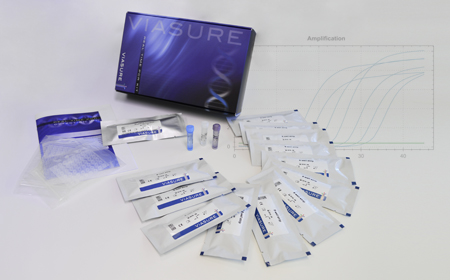
VIASURE Real Time PCR Detection Kits
Trypanosoma cruzi (Chagas)

Description
VIASURE Trypanosoma cruzi Real Time PCR Detection Kit is designed for detection of Trypanosoma cruzi in blood products from patients with clinical suspicion and/or symptoms of Chagas disease.
This test is intended for use as an aid in the diagnosis of the Trypanosoma cruzi in combination with clinical and epidemiological risk factors.
DNA is extracted from blood specimens, multiplied using Real Time amplification and detected using specific primers and a fluorescent reporter dye probe for T. cruzi.
Specifications
Information
Chagas disease (CD), also known as American trypanosomiasis, is a potentially life-threatening illness caused by the protozoan parasite Trypanosoma cruzi (T. cruzi). It is endemic in Latin America and spreading around the globe due to human migration. This microorganism is a hemoflagellate protozoan of the order Kinetoplastida and family Trypanosomatidae. T. rangeli is the second most common trypanosome species that infects humans in Latin-American countries, but it is a non-pathogenic parasite to humans and other mammals.
Trypanosoma cruzi is transmitted to humans by blood-sucking triatomine bugs, congenital transmission, blood transfusion, organ transplantation and by consuming food and juice contaminated with the parasite. Chagas disease to humans has two forms of transmission, natural and secondary transmissions. Natural transmission occurs when blood-sucking bugs from the triatominae subfamily eliminate the T. cruzi by feces or urine onto the skin of a human after feeding, which leads to scratch in the region because the feces or urine cause irratation. Thus, a small fissure is created in the skin that is sufficient for entry of the parasite into the bloodstream. Secondary transmission occurs by means of the transfusion, transplant, breastfeeding as well as during pregnancy.
Clinically, Chagas disease has two clinical phases: the acute early stage/phase (fatal for 2-8% of infected people) lasting up to 2 months which is characterized by fever and many circulating parasites in bloodstream but usually asymptomatic or unrecognized, and the chronic phase which can be classified into the indeterminate and determinate forms. The indeterminate stage may last for decades after infection, during which patients can transmit the parasite to others. The patient has evidence of immunity but remains infected. At this stage, infection is controlled, but the immune system does not prevent disease progression. Thirty to 40% of infected patients develop the chronic and symptomatic stage which causes cardiomyopathies and digestive tract pathologies.
Diagnosis is traditionally performed by serological methods based on different antigens (ELISA, IFA). Conversion to negative serology is currently the only test available to assess parasitological cure. However, this negative seroconversion can take years to decades after treatment to occur in adult population and is therefore not adequate as an endpoint for clinical trials. The polymerase chain reaction (PCR) could be the tool to amplify parasite DNA sequences with high specificity and sensitivity.
